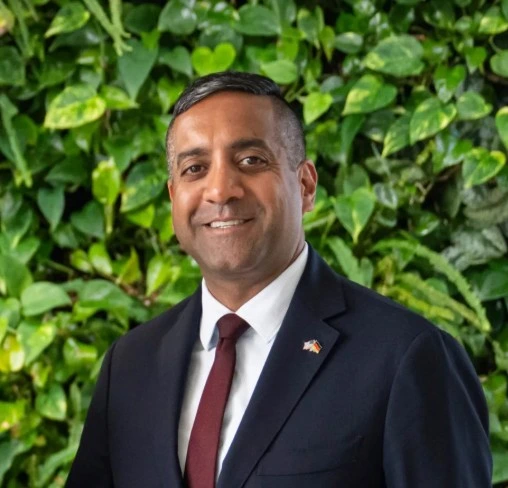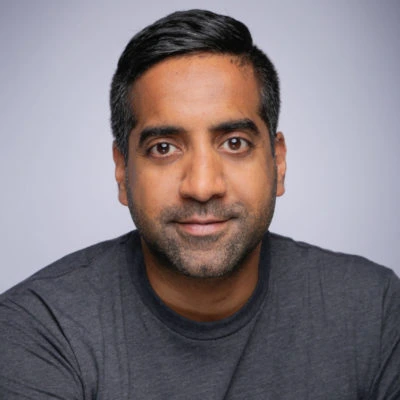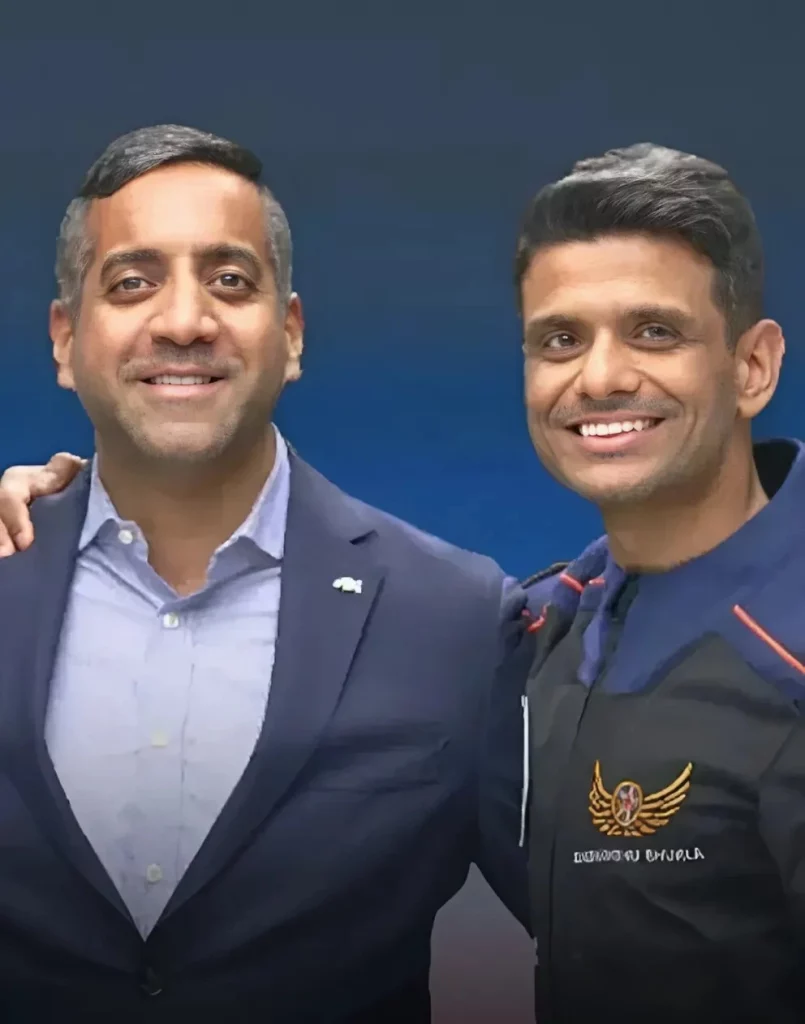(May 8, 2025) Late one night in 2021, Tejpaul Bhatia sat in New York scrolling through an email that would change his life. A fledgling space startup called Axiom Space was inviting him to help build the world’s first commercial space station – essentially asking him to leave a comfortable leadership role at Google for an uncertain mission in the stars. It was, as Bhatia later put it, “the one job in the world that would get me to leave Google”. For Bhatia – a lifelong space enthusiast who had been “dreaming about this since [he] was three years old” – the decision was both daunting and exhilarating. After all, as he quipped, “if you get a call from a rocket ship, take it… I got a call from a space station… so the answer was yes”. Now, in April 2025, he has been named CEO of Axiom Space, joining the ranks of Indians in the US diaspora who are breaking barriers and reshaping America’s high-tech frontier.
Columbia to ESPN3: Forging a Space Pioneer
Tejpaul “Tej” Bhatia’s passion for space took root early. Growing up as a curious kid in New York, he devoured stories of astronauts and rockets. “I’ve been inspired by space exploration since childhood,” he said, describing a fascination that never left him. His path to the space industry was anything but direct. He first built a foundation in technology – earning a computer science degree from Columbia University and cutting his teeth in the media and tech worlds. In the mid-2000s, Bhatia joined ESPN, where he helped launch the network’s online streaming services (ESPN3) in the US and abroad. It was a far cry from rockets and moonshots, but it gave the young product manager a taste of leading ambitious projects and working across cultures.
Restless and entrepreneurial at heart, Bhatia soon left the corporate stability of ESPN to forge his own path. Over the next decade, he founded or led three startup companies, experimenting with ideas from video chatting apps to collaborative education technology. Not every venture was a hit, but the experience was invaluable. As a startup CEO, he learned to wear multiple hats – coding late into the night, pitching to investors, and building teams on a shoestring. These early ventures taught Tejpaul how to adapt and innovate quickly, traits that would prove crucial in the fast-evolving space sector. By the time he entered his 30s, Bhatia had become a serial entrepreneur known for turning bold ideas into products. This period was his personal “trial by fire,” honing the leadership and hustle that a future in space would demand.

From Google Leader to Space Dreamer
In 2018, with a young family at home, Bhatia made a pivot back to the corporate world – joining Google in New York. After 10 years of startup rollercoasters, the tech giant offered stability. At Google, he took on leadership roles in the Google Cloud division, acting as a bridge between the company and the startup ecosystem. He met with Fortune 100 executives about the “future of work” and led strategic storytelling for Google’s Office of the CIO. By all accounts, Bhatia thrived. He later admitted he had found his groove at Google and even told colleagues he “would never leave Google,” considering it the “Holy Grail of tech” for that stage of his career.
But then came the call to adventure. In 2020, Bhatia learned of Axiom Space – a Houston-based startup founded to build commercial modules for the International Space Station (ISS). NASA had just awarded Axiom a $140 million contract to attach a habitat to the ISS. Tejpaul was intrigued. Here was a chance to marry his lifelong passion with his tech and business skills. He became an angel investor in Axiom that year, signaling his belief in its vision. Not long after, Axiom’s co-founders – NASA veteran Michael Suffredini and entrepreneur Kam Ghaffarian – approached Bhatia with a job offer. They wanted him to serve as chief revenue officer (CRO), effectively the company’s strategist for growth and monetisation. Bhatia recalls, “It took the one job in the world that would get me to leave Google”– and this was it. In July 2021, he took a deep breath, traded his Google badge for a hard hat in a space startup, and stepped across the threshold into a new industry.

A Leap to the Final Frontier at Axiom Space
Joining Axiom Space, Bhatia found himself at the forefront of a new kind of space race – not between nations, but between private companies trying to open low-Earth orbit to commerce. As CRO, he was tasked with answering a critical question: how do you make commercial human spaceflight viable? “As CRO my mandate is to create a hyper growth business platform that will serve as a launchpad for businesses, industries and markets to scale exponentially over the next seven to 10 years,” he explained. It was a bold vision to treat a space station like a platform for innovation – a Silicon Valley approach to outer space. “That’s a very different model than how the space industry has operated to date as a government taxpayer endeavor. The private sector is far better suited for the task,” Bhatia argued, reflecting his belief that entrepreneurship can accelerate space development.
Under his commercial leadership, Axiom secured over $1 billion in customer contracts in just a few years. These included multi-mission agreements with NASA and other space agencies, as well as flights for private explorers. Axiom’s Ax-1 mission in 2022 flew three paying customers and a former NASA astronaut, proving a fully commercial crew is viable. In 2023, Ax-2 carried two Saudi astronauts—including the first Saudi woman in space—on a government-funded flight. This year, Axiom is training an Indian Air Force pilot Shubhanshu Shukla for Ax-4, India’s first private spaceflight partnership. These milestones bring Axiom closer to a sustainable, accessible space-orbit business.
Beyond missions, Bhatia pushed Axiom to think outside the traditional aerospace box. He struck an unlikely partnership with Italian luxury brand Prada to design next-generation space suits for NASA’s Artemis III moon mission – a media-friendly collaboration that underscored Axiom’s innovative flair. He also championed microgravity research and in-space manufacturing initiatives, planting the seeds for future industries in orbit.

Tejpaul Bhatia with Shubhanshu Shukla
Leading Axiom Space at a Pivotal Moment
In April 2025, Axiom Space named Tejpaul Bhatia its new CEO, charging him with guiding the company through a critical phase as it races to build its commercial space station . He succeeds co-founder Kam Ghaffarian and calls the promotion “the realization of a lifelong ambition,” reflecting a passion “ignited in childhood and fueled by decades of experience” . Bhatia knows the road ahead is tough: Axiom aims to launch its first module in 2025, dock it to the ISS by 2027, and complete a free-flying station by decade’s end.
Those who have worked with Bhatia believe he’s the right leader for the job. “Tej has been instrumental in turning Axiom’s vision into reality. His entrepreneurial drive and commitment to our mission will ensure Axiom’s leadership as the space economy accelerates,” says Kam Ghaffarian, the company’s co-founder.
As Bhatia takes on the CEO role, he does so at a thrilling but critical time for space. Commercial human flights, once a dream, are now real—but the business is still delicate. As an Indian-origin leader making it big on the global stage, he’s landed deals with everyone from governments to fashion brands, strengthening the case for private space ventures. Now his job is to prove a commercial space station can be built and run smoothly for research, tourism, and industry. It’s the next step in a journey that began with a boy staring at the stars. Today, that boy—now CEO—is working to keep the door to space open for everyone. As he says, “This is not science fiction… It’s really happening”.
- Follow Tejpaul Bhatia on LinkedIn
ALSO READ | Indian-origin Canadian astronaut Dr. Shawna Pandya to lead space medicine mission in 2026



